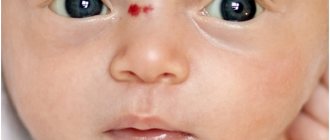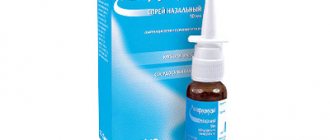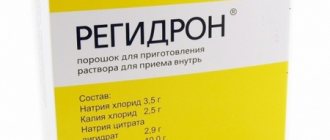03/19/2018 Category: Diseases and complicationsAuthor: Olga Arkhipova
Nasal congestion is often associated with colds. However, during pregnancy the situation is much more ambiguous. Especially if vasospasm in the nose does not cause a runny nose. In this case, the cause of such an unpleasant symptom is allergic reactions and other serious diseases, which can only be identified by a pregnant woman after visiting a doctor.
- Nasal congestion without runny nose
Video: rhinitis in pregnant women
- Traditional treatment for congestion
Video: massage for nasal congestion
- Video: how to cure a runny nose during pregnancy
Causes of nasal congestion in pregnant women
While carrying a child, a woman experiences a double load on her body due to the need to supply nutrients not only to herself, but also to the baby. Therefore, the immune system weakens during pregnancy and does not always cope with even the most harmless diseases such as a cold or runny nose.
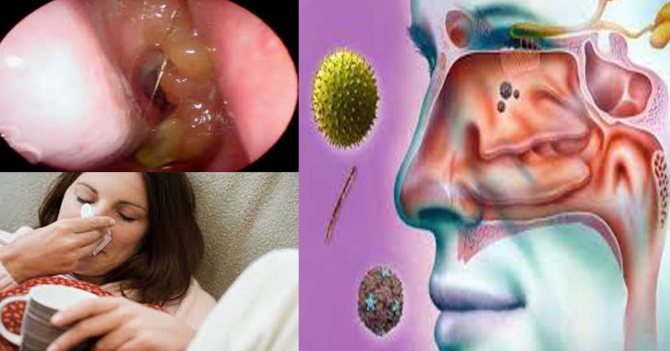
Nasal congestion during pregnancy may be caused by a seasonal viral infection.
It is not possible to unambiguously determine the nature of nasal congestion in pregnant women. Because due to hormonal changes in the nasopharynx, thickening of the mucous membranes occurs. And women carrying a child suffer not only from a runny nose, but also from periodic nosebleeds. After delivery, the body returns to its normal state, and the constantly stuffy nose syndrome disappears.
When pregnant women consult a doctor, other causes of the disease are identified:
- Allergic reaction. In this case, difficulty breathing is also expressed in an increase in the volume of mucus in the nose or, conversely, increased dryness of the nasal cavity. At the same time, the woman’s eyes water, itching and a rash appear on the skin. A pregnant woman often sneezes and complains of a sore throat. When visiting a medical facility, the expectant mother is prescribed a blood test. If the latter shows an increase in eosinophils in the blood, the doctor will make an appropriate diagnosis and prescribe antihistamines.
- Rhinitis. In other words, a runny nose and clogging of the sinuses in the nose with excess mucus. Appears under the influence of pathogenic microbes and viruses during colds, sore throat and other ENT diseases. To prevent the disease from becoming more complicated, you must visit a doctor and undergo a course of specially selected therapy. After all, during pregnancy, a woman’s body is weakened, which is why advanced diseases can negatively affect the development of the fetus.
- Sinusitis. With this disease, swelling of the mucous membranes of the nose begins due to the accumulation of mucus clots in the maxillary and frontal sinuses of the nasopharynx. The woman does not complain of a runny nose, but has difficulty breathing. Medical assistance in this case should be provided as soon as possible, because the lack of oxygen has a detrimental effect on the health of both the mother and the unborn child.
Runny nose in pregnant women
It happens that a woman does not yet know that she is pregnant, but her nose already begins to breathe poorly. Having excluded colds and allergies, we are talking specifically about a runny nose in pregnant women, which, as a rule, begins in connection with hormonal changes in the pregnant woman’s body and contributes to the sudden onset of swelling of the nasal mucosa. Its more frequent manifestations, according to statistical calculations, are observed precisely with the onset of the second trimester and almost always disappear after childbirth. Of course, it makes no sense to apply active therapeutic methods to it, since it cannot be completely cured. But it is, of course, possible to slightly ease a woman’s breathing condition. But it is very important, if you notice symptoms of a runny nose, to contact your attending gynecologist so that he can accurately diagnose whether you have a cold, allergic rhinitis, or hormonal changes. So, what to save yourself with?
Nasal congestion without runny nose
Doctors consider this condition to be one of the signs of pregnancy and refer to it as hormonal rhinitis. If the infection does not penetrate the nasopharynx, then 7–10 days after birth, nasal congestion will disappear.
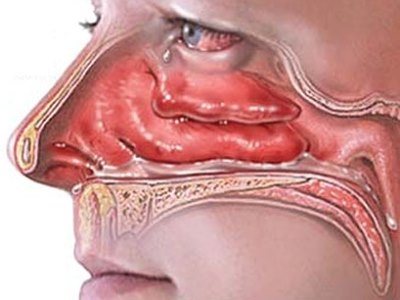
With sinusitis, swelling of the airways in the nose of a pregnant woman occurs
The situation is different with congestion complicated by a viral infection. In this case, due to undertreatment of the cold, purulent mucous secretion accumulates in the frontal and maxillary sinuses. And congestion turns into one of the forms of sinusitis - sinusitis or frontal sinusitis.
In addition, the following factors contribute to the complications of the disease:
- stress and nervous tension;
- lack of vitamins;
- carious condition of teeth;
- curvature of the nasal septum and sinuses;
- improper nose blowing;
- overgrown polyps and adenoids.
During pregnancy, a woman should carefully monitor her health and even treat a common cold under the supervision of a doctor. Otherwise, swelling of the nasopharynx may occur, causing insufficient oxygen and nutrients to reach the fetus. Which will lead to hypoxia or cause deviations in the baby’s development - pathologies in the brain and nervous system.
And for the pregnant woman herself, viral sinusitis threatens disturbances in the functioning of the organs of vision, brain, heart and kidneys. And also accumulations of purulent secretion in the nose lead to toothaches, inflammation of the facial nerves and osteomyelitis of the skull bones (a purulent-necrotic process under the influence of microbes).
To understand in time that sinusitis has taken the place of a cold, you need to pay attention to the following symptoms:
- pain in the bridge of the nose, wings of the nose and the back of the head;
- constant fatigue;
- temperature increase;
- prolonged nasal congestion - more than 7 days;
- dulled sense of smell;
- hacking cough at night;
- nasal voice and stuffy ears.
Video: rhinitis during pregnancy
How to relieve nasal congestion during pregnancy
In order not to progress the disease and not to risk the health of the baby, a pregnant woman should seek qualified medical help for a prolonged runny nose and nasal congestion.
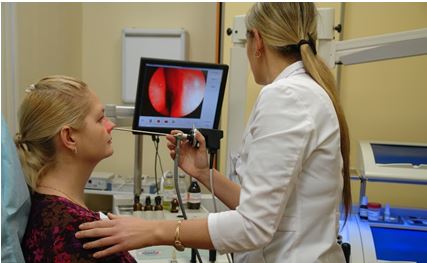
A pregnant woman undergoes rhinoscopy to make an accurate diagnosis of nasal congestion.
The doctor will use palpation to identify painful foci of infection, and will also refer you for rhinoscopy - examination of the nasal cavity using special mirrors.
In rare cases, an x-ray may be required, and before the 12th week of pregnancy such examination is generally prohibited. The puncture is also not recommended for pregnant women.
After conducting the necessary studies, the pregnant woman is diagnosed and gentle therapy is prescribed.
Traditional treatment for congestion
Drug therapy involves the use of sprays and nasal drops, as well as a course of inhalations. Since vasoconstrictor drops are prohibited during pregnancy due to their negative effects on the placenta, they should only be used as a last resort. If alternative methods of dealing with nasal congestion do not help, the doctor prescribes drugs that are used to treat children or even newborns - Otrivin, Nazivin. In advanced forms of the runny nose, a decision is made to take Vibrocil or Tizin. It is advisable to drip this medicine into the nose once before going to bed, and the maximum period of therapy is three days.
Photo gallery: nasal drops during pregnancy
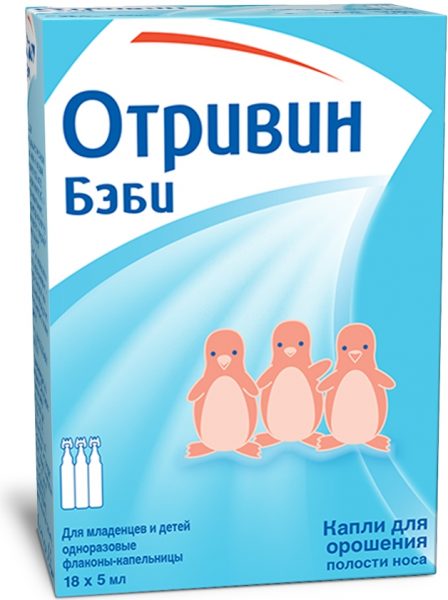
Otrivin for newborns is also suitable for expectant mothers
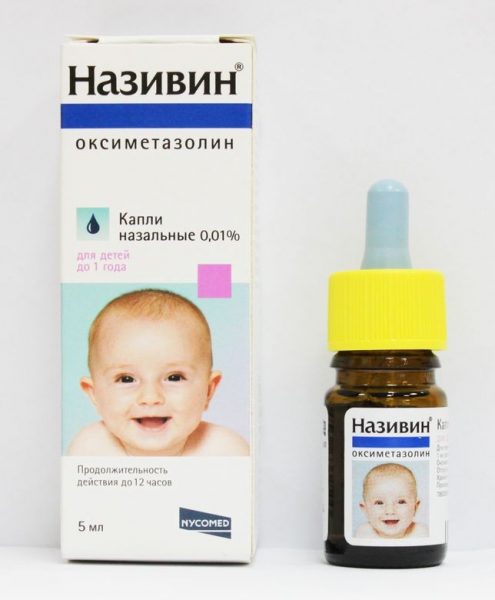
Nazivin for babies can also be used during pregnancy
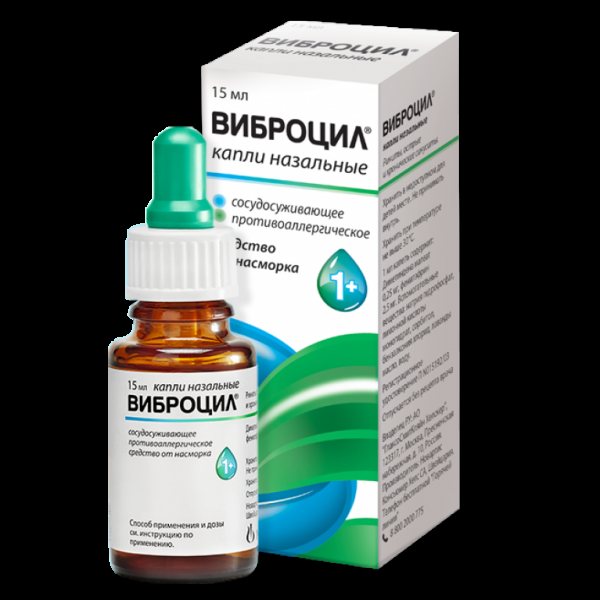
Vibrocil will help cope with allergic rhinitis

Tizin during pregnancy should be used only as prescribed by a doctor.
Other methods for relieving nasal congestion and swelling in the nasal passages are:
- Washing with saline solutions. Medicines based on sea salt - Aquamaris, Nosol, Dolphin - are considered safe for pregnant women.
For crusts, the ENT ordered me to drip oil into my nose - Vitaon, it softens them and restores the mucous membrane, and drip Quix (it is salty, like aquamaris, but more effective due to a different percentage of salt), all the crusts went away in 2 or 3 weeks, and Quix due to swelling I took drops for probably 16 weeks...
Asya Kurchatova
https://eka-mama.ru/forum/part188/topic304624/?PAGEN_1=2
- Irrigation of the nasal passages with homeopathic sprays - Pinosol, Delufen. The drugs are designed to relieve inflammation, stop the growth of pathogenic microflora and relieve swelling of the mucous membrane.
- Instillation of antibiotics starting from the 14th week of pregnancy - Isofra and Bioparox drops.
Inhalations involve inhalation of the above drugs through a special device - a nebulizer. The duration of each procedure should be no more than 10 minutes, and the course of treatment should not exceed 7 days.

Inhalation through a nebulizer is a modern and effective way to get rid of nasal congestion
Vitamin and mineral complexes suitable for pregnant women are also prescribed to strengthen the immune system. It is also important to adhere to the drinking regime (drink at least five glasses of liquid per day, if there is no swelling), and regular ventilation of the living space, and walks in the fresh air.
Breathing exercises to help the expectant mother
For nasal congestion that is not accompanied by fever and sore throat, it is acceptable to use breathing exercises. Especially when it comes to hormonal rhinitis. Indeed, in this case, the use of medications is inappropriate and can harm the baby’s health.

Breathing exercises help increase blood flow to the fetus during pregnancy
To get rid of an unpleasant symptom, you need to regularly perform the following set of actions:
- Pre-clean the nasal cavity with saline solution.
- Then sit down and take a comfortable position.
- Use your right finger to close your right nostril and inhale through your left nostril.
- Close your left nostril and exhale smoothly through your right.
- Inhale through both nostrils, hold your breath for 7-10 seconds, and exhale.
- Repeat the exercises no more than 10 times, taking a break after each for 5–7 seconds.
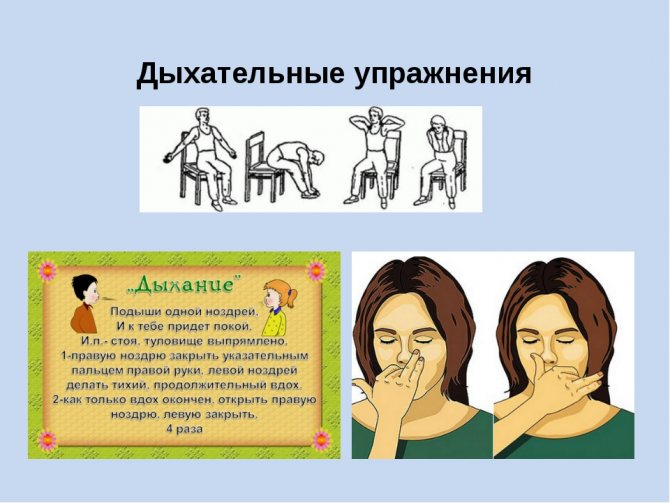
When performing breathing exercises, it is important to monitor the smoothness of your breathing, and try to take exhalations twice as long as inhalations.
Acupressure for rhinitis in pregnant women
Another way to relieve nasal congestion is acupressure. In addition, massaging special points with nerve endings close to the surface of the skin is considered an additional prevention of colds.

Acupuncture has long been considered an effective method of combating ailments.
To find acupuncture points, you need to lightly press with your fingertips on the area near the wings of the nose, between the eyebrows and near the temporal area. If the technique is followed, a feeling of numbness or aching will appear in these places.
The procedure for performing acupressure is as follows:
- We begin to massage parallel points next to the wings of the nose with our index fingers. Duration - no more than two minutes.
- Next, massage the area between the upper lip and the tip of the nose.
- We move to the area at the tip of the nose directly.
- We massage the points above the bridge of the nose and on the temples.
Thus, the procedure takes about 10 minutes, and the frequency is no more than three times a day. After the massage, it is recommended to drink plenty of fluids. It’s good if it’s a decoction of chamomile, lemon balm or linden.
IMPORTANT! You should not do acupressure at elevated temperatures, since due to intense blood circulation, hyperthermia may increase.
The best effect from such a procedure is achieved in massage rooms, because acupuncture specialists have extensive experience and know effective massage techniques.
Video: massage for nasal congestion
Folk remedies for nasal congestion
A popular method of treating rhinitis during pregnancy remains the use of medicinal herbs and essential oils, as well as other folk remedies.

Inhalation of potatoes or essential oils is the most famous way to combat a runny nose and nasal congestion.
Thus, the following recipes are popular among expectant mothers:
- The juice of one onion is diluted with water in a ratio of 1:2 and two drops are dropped into the nose three times a day.
- The pulp from an aloe leaf is kneaded to a pulp and diluted with water at the rate of 1:3, after which 1-2 drops are dropped into the nose twice a day.
- Chamomile or sage flowers are poured into a glass of water, brought to a boil, and after the decoction has cooled, the nose is washed with the product three times a day.
I only had congestion in the third trimester and then I got a cold, runny nose and cough. I washed my nose with sage decoction and lubricated it with oil, and drank Prospan syrup for coughs. I got over my cold in almost a week.
Ulyana
https://www.baby.ru/blogs/post/461765735–413881307/
- A teaspoon of natural honey is mixed with butter and applied to the nasal mucosa. A pregnant woman can only do this procedure if she is absolutely sure that she is not allergic to honey.
- Lemon juice from half a lemon is mixed with salt on the tip of a knife and diluted with two tablespoons of boiled water. The product should be instilled three times a day for 5 days.
Inhalation over potato steam or a bath with essential oils will also help relieve the condition and relieve swelling in the nasal cavity. Rosehip oil, sea buckthorn oil and peach oil are considered the safest for pregnant women. It should be remembered that a pregnant woman can breathe over the healing steam for no longer than five minutes, and after all the manipulations it is better to stay at home and avoid drafts.
How to pierce the nose with a runny nose using folk remedies
Alternative medicine has long known how to pierce the nose with a runny nose without using any medications. In her arsenal there is a large list of means that can both pierce the nose without drops and contribute to treatment, or even completely cure a person.
The most effective and widespread traditional medicines include:
- Cotton swabs with honey.
- Juice of medicinal plants.
- Mustard powder.
- Inhalations with garlic.

Cotton swabs with honey. An extremely simple way. The whole point is to generously lubricate the tip of a cotton swab with honey and insert it into the nostrils for 10-20 minutes, after which nasal breathing significantly improves.
Juice of medicinal plants . Fresh leaves of aloe or coltsfoot should be thoroughly crushed and the juice squeezed out of them, then instilled into the nose 3 times a day throughout the course of treatment.
Mustard powder . A very simple remedy that makes it possible to both pierce your nose without drops and completely get rid of a runny nose in just 1 night. All you need to do is pour mustard powder into your socks and wear them at night.
Garlic inhalations. After grating a few cloves of garlic on a fine grater, pour them into a small glass, placing it in a container with hot water. Next, cover the glass with a funnel made of plain paper and inhale garlic vapor through it for 2-3 minutes for each nostril. This procedure needs to be carried out 2-3 times a day.
Despite the lower effectiveness of folk remedies compared to pharmacological drugs, they are also able to relieve inflammatory reactions and nasal congestion, without having a negative effect on the body. Therefore, experienced doctors often include traditional medicines in the main treatment, especially for children and women during pregnancy.
Based on materials from gajmorit.com
Warming as a method of getting rid of rhinitis
If mucus has accumulated in the frontal or maxillary sinuses, then there may not be a runny nose. In this case, the pregnant woman feels heaviness in the bridge of her nose or forehead. To remove stagnant secretions from the nose, heating the nasal passages is used. The advantage of the procedure is safety, which is why treatment can be carried out an unlimited number of times and without having to monitor the duration of each session.
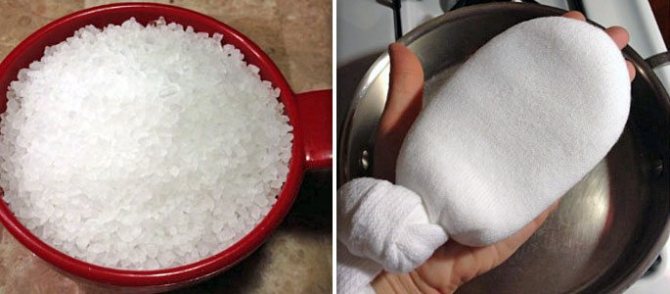
Table salt is often used to warm the sinuses.
Due to the impact of heated objects on the surface of the nose, the mucus inside the sinuses liquefies and leaves the diseased area. Which leads to easier breathing and reduced swelling.
Nothing will help, only childbirth. I’ve had this garbage throughout my entire pregnancy in its worst form (snot comes out through the mouth), and whatever gets into the stomach will still come out through the gag reflex. I’m waiting for childbirth like mana from heaven (of course, on time, as It wouldn’t be hard, I don’t need it before).
Natasha's mother Djordjovna
https://www.baby.ru/blogs/post/461765735–413881307/
Warming up is done using:
- only boiled eggs;
- bags of heated buckwheat or salt.
Before the procedure, a pregnant woman needs to measure her temperature, because hyperthermia cannot be treated with this method.
Video: how to cure a runny nose during pregnancy
Treatment of allergic rhinitis in pregnant women in the 2nd trimester
The treatment regimen for allergic rhinitis requires a special approach. Typically, a pregnant woman is prescribed antihistamines or hormonal nasal drops. But they are used only if it is not possible to exclude contact with the allergen and rhinitis is protracted.
Drugs for the treatment of allergic rhinitis during pregnancy in the second trimester
The following drugs are often used to treat allergic rhinitis:
- Zyrtec;
- Zodak;
- Nazaval (spray);
- Cromohexal (drops);
- Alcedin.
Allergy provocateurs
On a note! For allergic rhinitis, inhalations with herbal decoctions and essential oils should not be performed. They can worsen the condition and become an additional irritant for the body.
A runny nose during 12-24 weeks of pregnancy is quite common. If you carry out the necessary and safe treatment, it will pass without a trace. And if left unattended, it can lead to adverse consequences. Therefore, it is important to start treatment in a timely manner, be sure to consult a doctor. Pain to the left of the navel causes in women, study the link.
